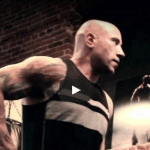To build a powerful and explosive golf swing you need to be using the best weight training exercises out there, otherwise, you’re wasting time.
During my weekly Q&A’s on Facebook, I am always asked:
What’s the best exercise for golf?
First, let me tell you what is NOT THE BEST exercise for golf.. the barbell bench press. Not very useful in golf, and in fact, if done with too much weight can actually injure you.
Compound, multi-joint free weight and bodyweight exercises that allow you to use the greatest amount of muscle mass will produce the best results for golf performance.
Time is precious and we need to shed any exercises that DO NOT increase our longevity and our drives.
So the best? The kettlebell swing … and here is why …
Most people just started hearing about swings in the last decade. Arthur Saxon though was doing them back in 1906. Swings were even a part of lifting competitions way back then.
Swings are great for:
* conditioning
* posterior chain strength
* explosiveness
* bigger glutes
* protecting the low back against injury
* actively lengthen tight hamstrings
A lot of the golfers I talk to are intimidated by the swing. In reality, it can be difficult to learn and will require some mirror time to make sure you are using the proper form.
I cringe just about every time I go in to the gym and see someone performing a kettlebell swing. Tons of knee bend and way too much upper body pulling. Improper form will not yield the results we want.
However, understanding the basic setup, and how close it is to the golf swing will get you moving ahead in the right direction.
How to properly do a Kettlebell Swing
The swing is a hip driven movement. This is why it is superior to all other exercises for golfers. Power comes from the hips and not from the upper body. The hand hangs on to the bell, and the arms are like a pendulum arm.
The hinge position is very similar to that of the address position for golf. Pro’s teach you to hinge at the waist during your address position and to maintain this through the swing.
The Hinge
- Practice the hinge by placing the kettlebell behind your back. Unlock your knees and hinge forward at the waist. Push your hips back out away from yourself and your chin forward. Eyes look straight ahead. Back is flat and not rounded.
- To return the weight up, squeeze the glutes and stand straight up.
- Practice the hinge and get the feel for it before you attempt a real swing.
Putting It All Together
Now let’s try a real swing making sure our back never rounds, our knees don’t overly bend, and we hinge properly.
You should not feel as though you are squatting the kettlebell up or pulling it up with the shoulders and arms.
Quite simply, you should feel like your hips drive the entire operation. The kettlebell goes along for the ride, much like the clubhead does during a swing. Your hips and glutes will be doing all of the work and can generate much more power than if you were to use the ‘squat and pull’ method I see so many people using in the gym.
- Set the ball on the ground in front of you – much like a deep snapper in football. Our goal here is to get the weight moving easily. Hike the bell back and let it flow back with straight arms.
- Pop the hips forward and up and let the body swing the kettlebell up. The momentum created by your hips will generate enough force to swing the kettlebell up to shoulder level.
- Let the kettlebell arc nicely back down and hike back through your legs.
I can not stress enough how important it is to not ‘squat and pull’ during the swing. 90% of the people I see at the gym do not do it properly.
Don’t Do This
* Bend over too far. Let the arms touch the top of the thighs.
* Squat. While there is some bend in the knees, they are engaged at setup and don’t vary much from there. Maintain your hinge.
* Walk forward. Keep your weight in your heels when the kettlebell is thrusting forward. Almost feel like you are leaning back a bit. Otherwise, the kettlebell will walk you across the floor.
Done properly though, the swing will yield a stronger back, flexibility (hamstring), improved conditioning, and more power for your golf swing.
Christian Henning, NASM-CPT, gfs, CTT
Certified Turbulence Trainer



Leave a Reply